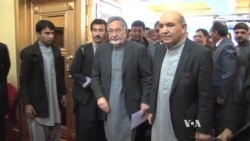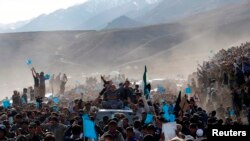KABUL —
In Kabul, giant, clean political posters overlook the city’s dusty, chaotic, traffic-filled streets. Here, open-air markets, small shopping malls, supermarkets and roadside stalls crowd each other, while men in turbans and women in blue burqas walk by blast walls topped with barbed wire.
Afghanistan is getting ready for presidential elections and all eight candidates are campaigning hard for the top slot. With current president Hamid Karzai constitutionally barred from a third term, the April 5 vote will be the first time power will be democratically transferred to a new leader.
Analyst Fred Kagan says it’s vital that the vote brings forth a new leader that is acceptable to the Afghan people. “Nothing less than the future of Afghanistan is at stake,” he says. “The prospect of having a peaceful transition from one elected Afghan leader to another elected Afghan leader not of the same family is enormous.”
Presidential hopefuls
Of nine presidential candidates, there are three front-runners. All are promising a future of stability and growth despite a weak economy and constant militant bomb attacks.
One is a former World Bank officer Ashraf Ghani. Seen as an intellectual, the carefully manicured Ghani is pledging to fight corruption and boost the economy. He is expected to continue the general political course set since the fall of the Taliban 13 years ago.
Another leading candidate is Zalmai Rassoul. A former foreign minister under current president Hamid Karzai, Rassoul, like Ghani, is a technocrat. Karzai’s brother Qayum left his own presidential bid to join Rassoul’s campaign. Critics say a vote for Rassoul is a vote for Karzai.
And there is Abdullah Abdullah, an anti-Taliban figure and eye surgeon. Abdullah is also promising jobs and stability, but, as the former Afghan foreign minister who also ran for president in 2009, he is also vowing to reform the current presidential political system, distributing more power to the parliament.
Stability, security
Andrew Wilder, director of the South and Central Asia programs at the United States Institute of Peace in Washington, calls the elections are crucial to the nation’s future.
“It’s so critically important, both for the future of political stability, security situation and the economic situation for these elections to go well," Wilder says. "So I think if they do go well, I think it will be transformative.”
The Taliban have vowed to forcibly disrupt the vote, and have already bombed and gunned down election workers, international observers, and police. On Saturday, Taliban militants attacked the headquarters of the Afghan Independent Election Commission, the latest in a series of attacks across the capital. The past month has been particularly deadly, with more than 100 civilians killed.
As for security, there are more green police pick-up trucks full of armed officers on the roads than usual. Missing are the fleets of armored vehicles that normally ferry international organization officers around the capital. US and international troops also now rarely make an appearance.
The Kabul Serena Hotel, attacked in mid-March by pistol-carrying teenage militants who left nine dead, is eerily quiet. International observers from the National Democratic Institute and Organization for Security and Cooperation in Europe who had been staying there left the country after the attack.
Free and fair vote
Jandad Spinghar, head of the Free and Fair Election Foundation of Afghanistan (FEFA), is concerned about their departure. “The presence of international observers gives legitimacy, international legitimacy, to the election process," he says.
Not all the international observers have gone, and Spinghar says it’s important that considerable numbers are present on voting day, as their stamp of approval will go a long way toward persuading losing candidates and voters to accept the results.
FEFA has some 10,000 local observers deployed around the country to monitor the polls.
Election officials and security officers are equally determined to see the ballot take place successfully. General Salim Ehsas, head of the election security commission, says Afghan forces are deployed around the country.
“We have enough police, military, intelligence officers to safeguard the polling stations and roads for our people. We have the full support of our people," he says. "We are in contact with elders, religious leaders, and have asked for their advice and support.”
Meredith "Chip" Buel contributed to this report from Washington, D.C.
Afghanistan is getting ready for presidential elections and all eight candidates are campaigning hard for the top slot. With current president Hamid Karzai constitutionally barred from a third term, the April 5 vote will be the first time power will be democratically transferred to a new leader.
Analyst Fred Kagan says it’s vital that the vote brings forth a new leader that is acceptable to the Afghan people. “Nothing less than the future of Afghanistan is at stake,” he says. “The prospect of having a peaceful transition from one elected Afghan leader to another elected Afghan leader not of the same family is enormous.”
Presidential hopefuls
Of nine presidential candidates, there are three front-runners. All are promising a future of stability and growth despite a weak economy and constant militant bomb attacks.
One is a former World Bank officer Ashraf Ghani. Seen as an intellectual, the carefully manicured Ghani is pledging to fight corruption and boost the economy. He is expected to continue the general political course set since the fall of the Taliban 13 years ago.
Another leading candidate is Zalmai Rassoul. A former foreign minister under current president Hamid Karzai, Rassoul, like Ghani, is a technocrat. Karzai’s brother Qayum left his own presidential bid to join Rassoul’s campaign. Critics say a vote for Rassoul is a vote for Karzai.
And there is Abdullah Abdullah, an anti-Taliban figure and eye surgeon. Abdullah is also promising jobs and stability, but, as the former Afghan foreign minister who also ran for president in 2009, he is also vowing to reform the current presidential political system, distributing more power to the parliament.
Stability, security
Andrew Wilder, director of the South and Central Asia programs at the United States Institute of Peace in Washington, calls the elections are crucial to the nation’s future.
“It’s so critically important, both for the future of political stability, security situation and the economic situation for these elections to go well," Wilder says. "So I think if they do go well, I think it will be transformative.”
The Taliban have vowed to forcibly disrupt the vote, and have already bombed and gunned down election workers, international observers, and police. On Saturday, Taliban militants attacked the headquarters of the Afghan Independent Election Commission, the latest in a series of attacks across the capital. The past month has been particularly deadly, with more than 100 civilians killed.
As for security, there are more green police pick-up trucks full of armed officers on the roads than usual. Missing are the fleets of armored vehicles that normally ferry international organization officers around the capital. US and international troops also now rarely make an appearance.
The Kabul Serena Hotel, attacked in mid-March by pistol-carrying teenage militants who left nine dead, is eerily quiet. International observers from the National Democratic Institute and Organization for Security and Cooperation in Europe who had been staying there left the country after the attack.
Free and fair vote
Jandad Spinghar, head of the Free and Fair Election Foundation of Afghanistan (FEFA), is concerned about their departure. “The presence of international observers gives legitimacy, international legitimacy, to the election process," he says.
Not all the international observers have gone, and Spinghar says it’s important that considerable numbers are present on voting day, as their stamp of approval will go a long way toward persuading losing candidates and voters to accept the results.
FEFA has some 10,000 local observers deployed around the country to monitor the polls.
Election officials and security officers are equally determined to see the ballot take place successfully. General Salim Ehsas, head of the election security commission, says Afghan forces are deployed around the country.
“We have enough police, military, intelligence officers to safeguard the polling stations and roads for our people. We have the full support of our people," he says. "We are in contact with elders, religious leaders, and have asked for their advice and support.”
Meredith "Chip" Buel contributed to this report from Washington, D.C.







